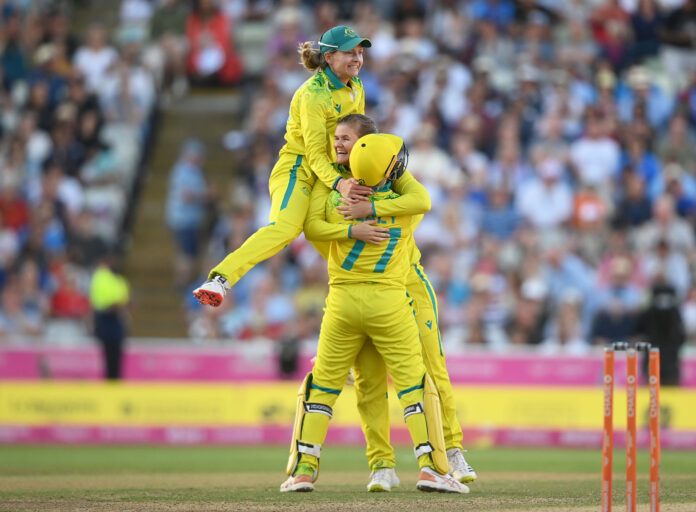

Australia and India contested the Gold medal match to conclude the Cricket section at the 2022 Commonwealth Games held in Birmingham.
This was only the second time Cricket was played at the Commonwealth Games and Australia assured that they go home with a Gold medal, unlike last time when they finished second.
Here's the breakdown of how the podium was finalised.
Semi-Finals
Starting off the finals were India and England, who played in the first semi-final on August 6. England played brilliantly in the group stages and remained unbeaten, topping Group B, Whereas India only lost one game against Australia in the group stages to finish second in Group A.
The toss for this thriller was won by India who elected to bat first with their opener, Smriti Mandhana, starting in explosive style, with the opening stand with Shafali Verma worth 76 runs in just 7.5 overs. Mandhana was the second wicket to fall on the score of 77, out of which 61 runs were scored by Mandhana in just 32 balls. Fine support was given by batter Jemimah Rodrigues who remained unbeaten at 44 to guide India to a total of 164/5. The pick of the English bowlers was Freya Kemp who took 3 for 22 with an Economy Rate of 7.33.
England's top and middle order did not falter coming out to chase. With all their top five batters crossing double figures. Captain Nat Sciver top scored with 41. The dent in the run chase was caused by some fine fielding on display by the Indian Women. Three set batters were run out, making the chase a little too steep for the lower English order. When Sciver was run out, England needed 14 runs off 7 deliveries, which proved too much, and they lost the match by 4 runs. In a tight game like this, the pick of the Indian bowlers was Deepti Sharma, who only took 1 wicket but gave away only 18 runs in her allocated 4 overs which proved decisive in the end.
The second semi-final was also held between trans-Tasman rivals, Australia and New Zealand.
Australia won the toss and elected to field first. It wasn't a good start for the White Ferns as they lost their star batter, Suzie Bates, in the very first over. At 2/39, things looked a bit bad for New Zealand but they finally managed to stitch together a partnership. Captain Sophie Devine and Amelia Kerr (40) played well and put together a partnership of 73 runs before Devine fell for a well-made 53. Wickets fell regularly after this and New Zealand slumped from 2/112 to 7/144 in their 20 overs. Australian Megan Schutt had a field day with the new ball, picking up 3 wickets for 20 runs with an impressive economy rate of 5.00.
Chasing this total would not be easy against a strong New Zealand bowling attack and it proved so. Australia's star batters, Alyssa Healy and captain Meg Lanning were soon back in the dugout by the 5th over. Useful 30's from Beth Mooney (36) and Tahlia McGrath (34) ensured Australia remained on track. 19 from Rachael Haynes and not-out innings of 19 from Ashleigh Gardner ensured Australia chased the target on the 3rd ball of the last over, handing them a spot into the gold medal match. New Zealand's Lea Tahuhu had brilliant bowling figures of 3/20 including a maiden but it all went in vain.
Medal matches
The bronze medal match was held between the losing semi-finalists, England and New Zealand on August 7.
England won the toss and elected to bat first. The decision proved to be a disaster as eight out of the 11 batters scored single-figure scores. The top scorer for England was captain Nat Sciver who made 27. She along with Amy Jones (26) and Sophie Ecclestone (18) made sure that England crossed 100. They finally made 110 for the loss of 9 wickets in their 20 overs. For New Zealand, Hayley Jensen took 3 wickets for 24, and Fran Jones and Sophie Devine took 2 wickets each.
In reply, New Zealand eased through the chase by chasing the total in the 11th over. Captain Devine scored 51* and they only lost 2 wickets.
The Gold medal match was a Day/Night fixture held on the 7th of August. The stage was set for yet another thriller.
Australia won the toss and chose to bat first. Despite losing Alyssa Healy early, Beth Mooney and captain Meg Lanning (36) put together a useful partnership of 74 runs. Mooney top scored with 61 which included 8 boundaries. Cameos from Ashleigh Gardner (25) and Rachael Haynes (18*) allowed Australia to set a target of 162 for India. Renuka Singh had the best bowling figures for India in this game. She picked up 2 wickets for 25 runs.
India did not have the best of starts to their run chase as they lost both their openers, Shafali Verma and Smriti Mandhana with a score of just 22. Just like the Australian innings, a third-wicket partnership of 96 between Jemimah Rodrigues and Harmanpreet Kaur kept the innings stable. At 2/118 in the 15th over, India looked comfortable winners but the damage was just around the corner. From 2/118, India became 5/121 and further wickets were lost, making sure that they got bowled out for 152. There were six single-figure scores out of their last 7 batters. Excellent bowling by all the Australian bowlers and some wonderful fielding made sure the collapse happened. Gardner was the pick of the bowlers, taking 3 wickets for just 16 runs.
Final standing:
Gold: Australia
Silver: India
Bronze: New Zealand





